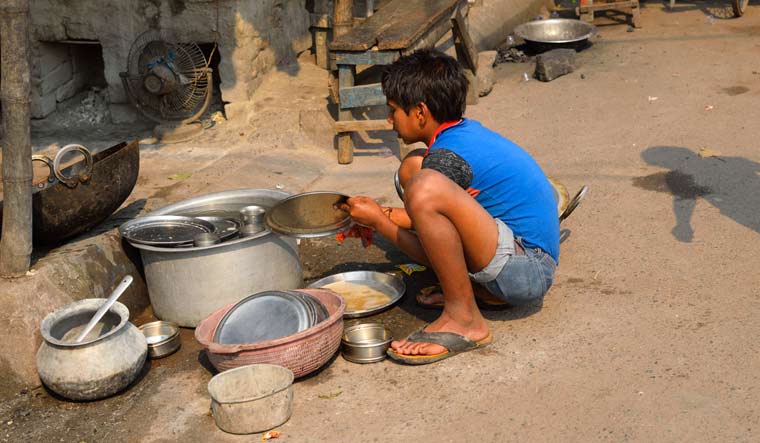Child labour might not be easy to eradicate given the worrying perception of Indians on the issue, as brought forth by a rapid assessment survey on social perception of child labour conducted by Child Rights and You (CRY) India volunteers on the occasion of World Day against Child Labour (June 12).
The survey shows that 45 per cent of the surveyed population (3770 individuals over 18 years of age) believed that it was alright for the children to work to support their families, as long as they continued to go to school. Similarly, 45 per cent did not consider taking help of kids in family business, cattle rearing or agriculture work as 'child labour'. Shockingly, as many as 37 per cent felt that money earned by kids was essential to running the household.
However, a majority 86 per cent people did agree that child labour practices increased in the country after Covid-19 pandemic. Also, 69 per cent believed that poverty is the main reason for child labour.
The survey brought out that 77 per cent of respondents greatly underestimate the prevalence of child labour in India. Responding to the questions 'how many child labourers are there in the country as per latest data?' Only 23 per cent were close to the right answer.
As per the latest Census data available (2011), the total child population in India in the age group (5-14) years is 259.6 million. Of these, 10.1 million (3.9% of total child population) are working, either as ‘main worker’ or as ‘marginal worker’.
Some respondents seemed to believe that only children under the age of 14 years are considered as child labourers.
“While many of the responses reflect a healthy understanding of the issue and its long-term ramifications, quite a few of the findings are thought-provoking and are genuine matters of concern,” said Trina Chakrabarti, Director, Volunteer Action, CRY.
She added that lack of mass awareness, among other things, is one of the biggest stumbling blocks in addressing the issue of child labour. “The objective of the study was to assess and introspect the perception, knowledge and attitude of Indians.”
The rapid assessment further showed that 17 per cent respondents did not know what to do if and when they spot a child working as a labourer, though 79 per cent said that they would contact the authorities or an NGO if they notice a child labourer. “These findings are reasonably good indicators behind the under-reporting of cases related to child labour,” Chakrabarti said.
When asked if they are aware of any existing law or act which prohibits the employment of adolescents (aged 14-18) in hazardous occupations and processes, 33 per cent of respondents said yes, while 36 per cent said they are aware of the law but have no idea of the occupations defined as hazardous; another 31 per cent said that they are unaware of any such law.
The responses to the above questions clearly point to the widespread confusion and lack of awareness prevailing in the minds of the people about the child labour laws in the country, Chakrabarti pointed out.
“We believe that it’s high time to pause and take a relook at where the malady lies. To prevent and end child labour, one has to first know and understand what child labour is, and also the related laws in the country. Awareness about the issue has to be increased, and mindsets have to change,” she said.
Some more findings
90% of those surveyed believed that a person should start working only once they are an adult
87% felt that children who go to school have brighter futures than children who work
72% believed that child labourers are at a heightened risk of developing illnesses; 23% were unsure, and probably unaware of the various risks involved
74% believed that child labourers were more violent
39% thought that children working in the entertainment industry should be considered child labourers, while 34% felt they shouldn't be; 28% were unsure
90% of respondents are aware that it is unlawful to employ children under 14 in factories and mines


